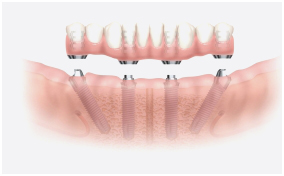Most people facing tooth loss or who have recently had teeth removed will want to get them replaced as soon as possible, and dental implants are an increasingly popular choice. However, some may want to wait a bit before having dental implant treatment or could decide to replace their teeth with dentures or a dental bridge while they think about their options.
If you are procrastinating about this treatment, it’s worth considering the advantages of having dental implants in Ajax, preferably sooner rather than later. One of the significant benefits of earlier treatment is the protective effect on your jawbone. When your own teeth are removed, then it soon affects your jawbone.
What Happens to Your Jawbone After Natural Teeth are Removed?
Your natural teeth are surrounded by what is called alveolar bone and which is really quite fragile. All the while you have your own teeth, the alveolar bone receives plenty of stimulation form the tooth roots, signalling the body to replace old bone cells as they age and die. The stimulation is lost when natural teeth are removed by your dentist in Whitby, resulting in the alveolar bone gradually resorbing.
The alveolar bone in the jaw continues deteriorating after tooth loss, but much of the bone loss occurs during the first 18 months after tooth extraction in Pickering. As bone diminishes, there is less support for your facial muscles and cheeks and lips, and it is the reason why people who have suffered complete tooth loss can look as if their facial features are collapsing inwards. If you choose dentures to replace your teeth, then these rest on the gums and can accelerate bone loss.
How Dental Implants Protect Your Jawbone
One of the most amazing things about having dental implants in Newcastle is that bone loss in your jawbone is halted. Dental implants are designed to act as artificial tooth roots, restoring stimulation to the alveolar bone and preventing further bone loss.
When you delay having dental implant treatment in Clarington, then there is the increased risk that you’ll need a bone graft before having dental implants in the future. A bone graft is a routine procedure, but it could extend the time needed to complete your treatment. Dental implants must be surrounded by strong and healthy bone with which to bond and integrate.
Protecting Your Natural Teeth
Dental implants also help to preserve your natural teeth, preventing unwanted tooth movements. They help to share the stresses created whenever you bite or chew food, so there’s less chance of your natural teeth becoming chipped, cracked or worn down excessively. Your dentist in Pickering won’t need to reshape your natural teeth in any way, which is the case when you have a conventional dental bridge. If you decide to have dental implants later on, then your reshaped teeth will still need protecting with dental crowns.
It’s Never Too Late for Treatment
Ideally, it is better to have dental implants in Courtice soon after tooth loss, but if this wasn’t possible then don’t worry. Even people who lost their teeth many years ago can still benefit from this treatment, and bone and gum grafting can restore lost tissue in preparation for implants. Additionally, some procedures are specifically designed to maximize the use of available jawbone by placing the implants in positions where the jawbone is naturally thicker and stronger. For example, teeth in a day or All-on-Four is a procedure where the implants are placed towards the front of the mouth.
There are many different treatment options for dental implants in Brooklin. The best way to find out which might help you is to take that first step and see an implant dentist here at Durham Implant Solutions. Dental implants offer clear benefits for your dental health and of course, for your smile.


